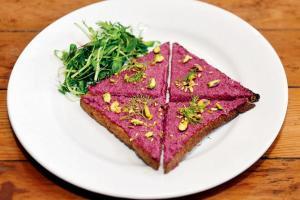From pulp to peels, chef Arina Suchde's new sustainable menu at The Pantry is changing the attitude towards food waste, one innovative dish at a time

Beet Tatziki toast. Pics/Ashish Raje
After braving the afternoon sun on a hot May day, the cool confines of the all-white interiors of The Pantry are a breath of fresh air. Chef and mixologist Arina Suchde is waiting for us and we are here to discuss The Pantry's new sustainable menu, which Suchde has designed, and that uses leftovers from the kitchen. After settling in, we immediately start discussing food waste in the industry — a serious concern that plagues people at various touchpoints across the globe. Suchde brings to our notice that food waste, in fact, starts in the kitchen, even before we begin cooking.
ADVERTISEMENT
"A lot of produce doesn't even make it to the shelf. From the farm to the wholesaler to the local retailer, a lot of produce gets left behind in our quest for the best shape, colour and size. A good amount of produce is also lost due to storage and logistics. Furthermore, at an ultra-local level, we argue with the sabziwalla for giving us cauliflower with stalks that takes up most of the weight of the vegetable and would eventually be discarded — but then that's where the chunk of the nutrition is," explains Suchde, who is one of the few chefs in the city who is passionate about reducing food wastage.

Probiotic whey soda
We agree that food waste has a lot to do with the consumers mentality. "The waste outside markets in Dadar and Vashi are a testimony to our ignorance. Instead of cribbing with the vendor because you feel you are not getting your money's worth, a sustainable option would be to use the perfectly edible stalks. Having said that, it is important to know where your food comes from because if you are using the peels, then you need to be sure it is pesticide-free," says Suchde. We also discuss how farmers' market's are a great way to bridge the gap and create awareness. However, the reach is limited. "That's why when restaurants create sustainable menus, they end up showcasing how food waste can be used creatively," adds Suchde.
Building the menu
Suchde approached The Pantry for a sustainable menu project because she already knew they source their ingredients locally, the produce is organic and seasonal and that they would be open to the idea. Designing the menu was a long process that involved a lot of brainstorming, trails and errors. The team wanted healthy but fun, creative and familiar recipes that people don't hesitate to try.

Arina Suchde makes carrot tacos
Instead of working backwards by creating a menu then going about looking for waste that could be incorporated, Suchde spent a few shifts at the counter to understand the amount of waste and where it was coming from. Since most of the food came from a central kitchen, food wastage was minimised as peels and pulps were diligently used in stocks and gravies and across the restaurants that the kitchen served. What she noticed though was that most of the food waste came from the cafe bar where fresh fruit was cold pressed for instant consumption.
Also read: Mumbai Food: Try this newly opened patisserie in Saki Naka
Making waste the hero
"If you make a new sustainable menu and then source for more ingredients to fit it, it would defeat the purpose of sustainability. The idea was not to add more items to the grocery list but to see how the existing waste can be utilised into their existing dishes, without exerting the chefs," adds Suchde. As they progressed, the team realised that instead of making food waste a smaller component of a main dish, a better idea would be to make it the hero of each dish.
"There would be no way to showcase the food waste — even if it is mentioned on the menu — if it was lost in a pickle or a side dish. For instance, the pulp from the signature carrot-ginger juice is used to make baked taco that along with refried beans and avocado-sour cream drizzle is a satisfying meal." We loved the homemade, gut and kid-friendly Whey fermented soda made with water discarded when making hung curd or cheese. The beetroot Tzatziki toast uses the residue pulp from the beetroot juice and is a completely different take on Tzatziki. For desserts there is sugar-free almond, cocoa cinnamon and coconut energy bites made from almond pulp left from their in-house almond milk. A befitting end is the detox tea, a soothing infusion of pomegranate and orange peels dehydrated and brewed with fresh mint and ginger.
Catch up on all the latest Mumbai news, crime news, current affairs, and also a complete guide on Mumbai from food to things to do and events across the city here. Also download the new mid-day Android and iOS apps to get latest updates
 Subscribe today by clicking the link and stay updated with the latest news!" Click here!
Subscribe today by clicking the link and stay updated with the latest news!" Click here!






